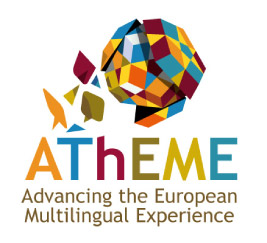The multilingual experience in Europe under study: meeting of the consortium of the AThEME project
The multilingual experience in Europe under study: meeting of the consortium of the AThEME project
A project of the EU’s 7th Framework Programme, the consortium which is meeting from 15 to 17 November at the UPF Ciutadella Campus. Albert Costa leads the scientific coordination of the project which comprises fifty experts who are studying different aspects of European language heritage.
AThEME (Advancing the European Multilingual Experience) is a project of the EU’s 7th Framework Programme that focuses on the study of multilingualism in Europe via three levels of approach: individual, collective and social. It is a five-year project spanning from March 2014 to March 2019, and has the support of the European Commission and a budget of 5 million euros. Albert Costa, ICREA researcher with the Department of Information and Communication Technologies (DTIC) at UPF and head of the research group on Language Production and Bilingualism (SPB), is the project’s scientific coordinator.

From 15 to 17 November, Pompeu Fabra University together with Bilingualism Matters (University of Edinburgh), are organizing the meeting of the AThEME consortium members which will host experts in various aspects of bilingualism in order to discuss the progress of the project and disseminate the results obtained so far in the study. The event will take place in the multipurpose hall of the Mercè Rodoreda building on the Ciutadella campus.
AThEME’s final goal is to provide messages and specific recommendations in terms of language policy on the multilingual experience in Europe.
An academic programme on bilingualism and society
AThEME strives to look into cognitive, linguistic and sociological issues within a multilingual Europe; assess existing public policies and practices in the areas of education and health as well as their impact on multilingualism, and finally contribute to the formulation of evidence-based policies.
To do so, AThEME uses extensive research methodologies and aims to raise awareness of multilingualism to policy makers, health professionals, academics and educators. The project consortium is structured around four main areas of research: linguistic, cognitive sciences, communication and culture, and social sciences, in which expert researchers from Germany, Croatia, Slovenia, Spain, France, Italy, the Netherlands and the United Kingdom are working in a total of seventeen research institutions.

The first group focuses on regional minority languages in multilingual Europe. Its main objective is to increase the general understanding of multilingualism, which includes minority regional languages. From a linguistic perspective, the researchers aim to provide a description and analysis of the grammatical diversity of the different regional languages of today’s Europe. From a cognitive perspective, the researchers are interested in the effects of language and cognition in various contexts of regional multilingualism. Finally, they intend to explore strategies capable of guaranteeing the existence of regional bi- and multilingualism.
The second group is studying the languages that make up the linguistic heritage of the EU, a heritage that families spread when they move from one country to another. The experts are first seeking to understand the sociolinguistic context and the factors that contribute to partial language development (when the heritage language is not fully acquired), and the attrition of heritage languages (when speakers lose proficiency in their heritage language). The project will also study the impact of heritage languages on the dominant language.
The third area of the AThEME project is to study the relationship between multilingualism and communicative impairment. Many people experience a form of communicative impairment (stutter, dyslexia, specific language impairment (SLI), aphasia). AThEME aims to increase the scientific evidence base to benefit assessments and health policies in these areas of health and also to translate this evidence into concrete tools and applications for the benefit of society.
And finally, the project explores the cognitive aspects of multilingualism. That is to say, it seeks to gain knowledge about factors such as the age of onset (age at which an individual learns a second language), or the language distance (or degree to which one language differs from another), and how they affect the final outcome of a person’s second language acquisition; to investigate the direct effects of multilingualism in human interaction and collect more data and gain greater knowledge of the relationship between language and other mental operations, such as attention and memory.
